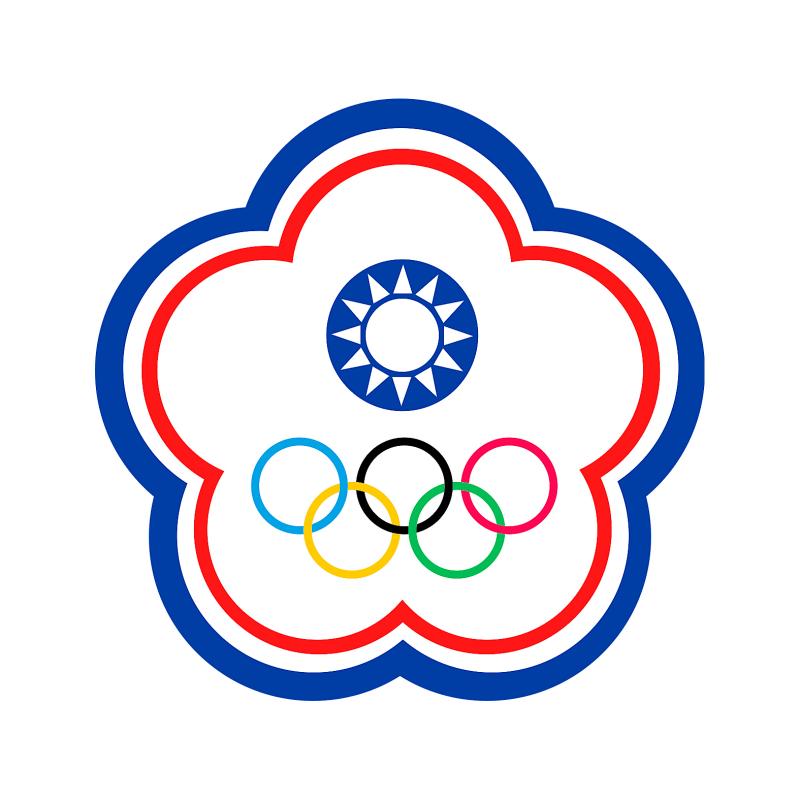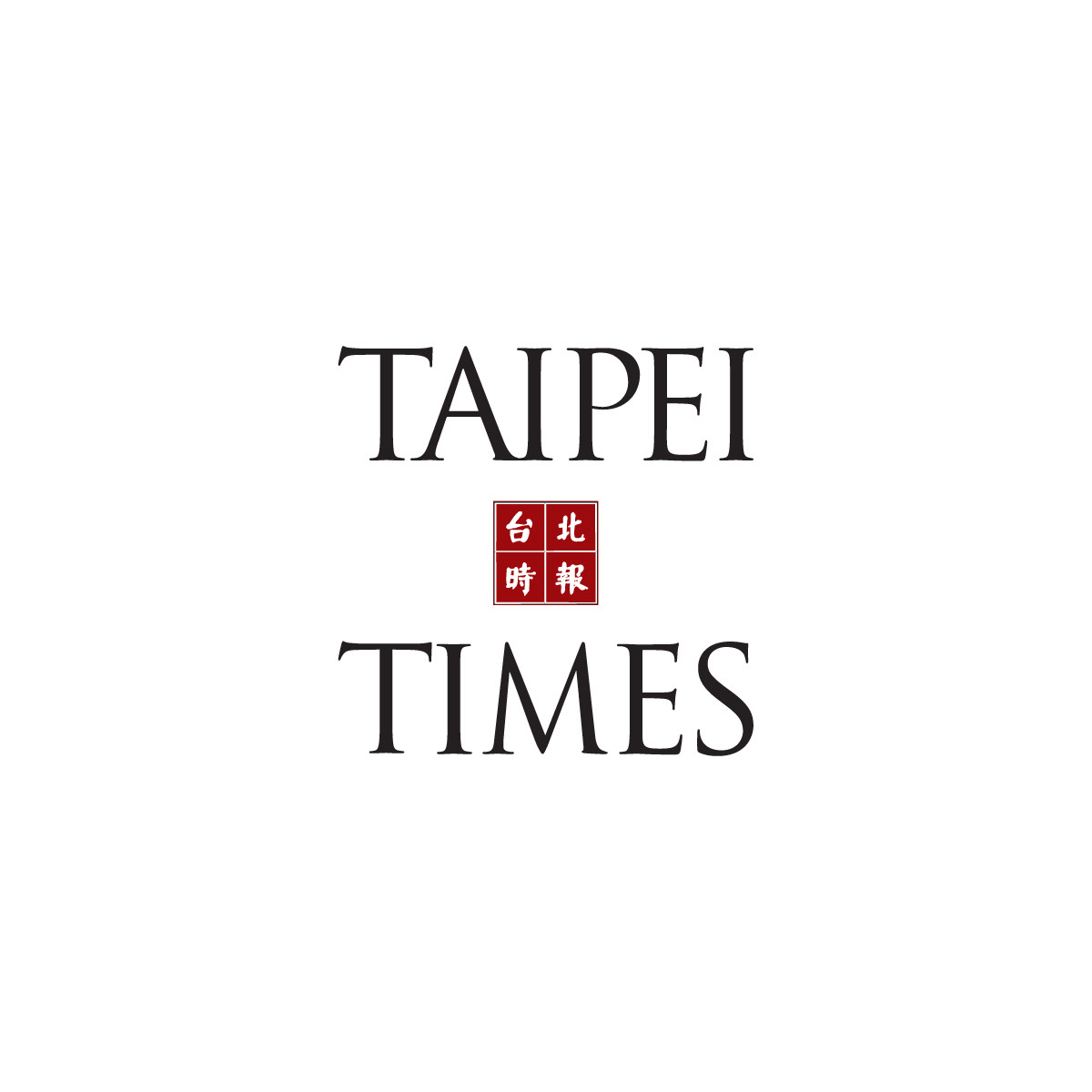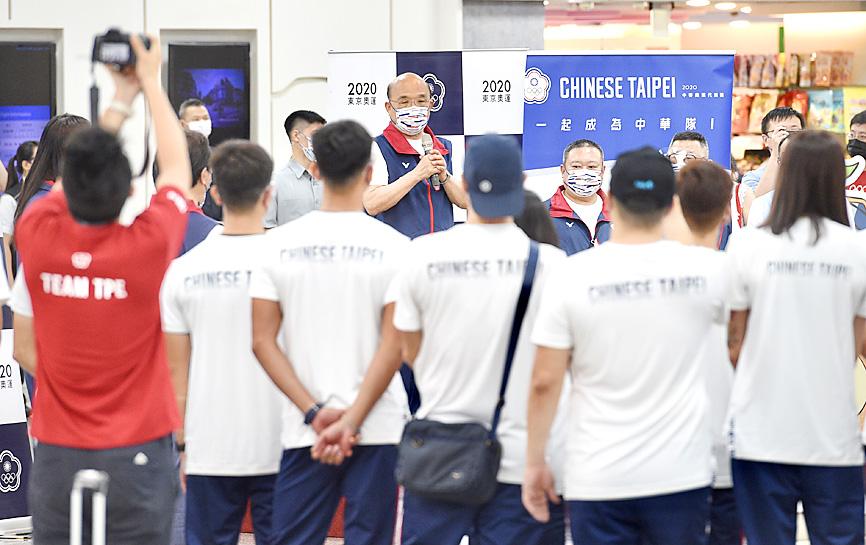Lawmakers say CTOC requires ‘transitional justice’
 ]
]
Lawmakers say CTOC requires ‘transitional justice’
By Jason Pan / Staff reporter
Lawmakers yesterday questioned ties between members of the Chinese Taipei Olympic Committee (CTOC) and the Chinese Nationalist Party (KMT), calling for “transitional justice” after a controversy over airplane seating for Taiwan’s Olympic athletes.
As the Olympic delegation left for Japan on Monday, badminton player Tai Tzu-ying (戴資穎) wrote on Instagram that she missed the roominess of the seating in EVA Airways’ business class, which drew apologies from President Tsai Ing-wen (蔡英文), Premier Su Tseng-chang (蘇貞昌) and other officials, as Tsai in 2016 had pledged that all athletes and their coaches would fly in business class to international competitions.
Democratic Progressive Party (DPP) Legislator Huang Kuo-shu (黃國書) yesterday said that in Taiwan, as in most countries, non-governmental organizations run the national Olympic committee so that politics do not interfere.
The Chinese Taipei Olympic Committee’s logo, including the emblem of the Chinese Nationalist Party (KMT), is pictured in an undated photograph. Screen grab from the committee’s Web site.
The DPP administration does not make decisions for the Olympic delegation, Huang said.
The Sports Administration gives the CTOC the funds for the Olympics, but the administration has no say in the committee’s decisions, otherwise it would not be in compliance with the International Olympic Committee’s charter — most Taiwanese do not understand this, he added.
While Olympic athletes being seated in economy class sparked a public furor, pan-blue politicians placed the blame on the president and the DPP government, saying that they had betrayed the athletes’ trust and deceived the public.
Taiwan’s women’s archery team do their final practice yesterday before competing at the Tokyo Olympics in this morning’s ranking round. Photo courtesy of Ni Tai-chih
On Wednesday, Taiwan Statebuilding Party Legislator Chen Po-wei (陳柏惟) said that the CTOC and most sports governing bodies in Taiwan are either controlled by KMT members, affiliated with them, or controlled by businesspeople with close KMT ties.
CTOC president Lin Hong-dow (林鴻道) is the second-generation owner of property-development conglomerate Hung Kuo Corp (宏國建設) and his mother, Lin Hsieh Han-chien (林謝罕見), was a high-ranking KMT official, Chen said.
CTOC vice president Chen Shyh-kwei (陳士魁) was Executive Yuan secretary-general under former president Ma Ying-jeou (馬英九), while CTOC top adviser Sun Lih-chyun (孫立群) was Executive Yuan spokesman under Ma, Chen added.
Sports in Taiwan need transitional justice, Chen said.
“Changes must be made to allow new members and the younger generation into these sports bodies,” Chen said.
KMT-affiliated officials take up the top posts, not because of their sports expertise or experience in sports business, but because of their loyalty to the KMT during the party’s authoritarian regime, he said.
DPP Legislator Rosalia Wu (吳思瑤) said that many athletes and citizens are demanding that the CTOC and Taiwan’s other sports governing bodies have greater transparency and better accountability, including calls for another round of sports reform, following amendments to the National Sports Act (國民體育法) in 2017.
The Sports Administration allocated NT$150 million (US$5.35 million) to the CTOC, which decided on how to spend the money without lawmakers or the public, Wu said.
“These entrenched problems keep recurring, especially with the CTOC, where Olympic athletes get angered and complain to the public,” Huang said. “So it is once again time to push for reform at the CTOC and other sports governing bodies, to make changes and make them more accountable and transparent.”
Olympic hosts should back Taiwan
 ]
]
Olympic hosts should back Taiwan
By Lindell Lucy
Dear future hosts of the Olympic Games:
Four of the next five Olympics are scheduled to be held in democracies: Japan (Tokyo, this month); France (Paris, 2024); Italy (Milano Cortina, 2026); and the US (Los Angeles, 2028). Democratic nations are the top bidders for the 2030 Olympics, while Brisbane, Australia, is so far the only city being considered for the 2032 games.
As you might know, one of our democratic friends, Taiwan, is being relentlessly harassed by China’s authoritarian rulers, the Chinese Communist Party (CCP). It claims that Taiwan is a part of the People’s Republic of China, even though it is not and never has been. The CCP frequently threatens to take over Taiwan by force.
As part of its campaign of psychological and diplomatic warfare, the CCP has been using the Olympics as a tool to humiliate Taiwanese, to deny them of their basic rights, and to undermine their democracy. Flabbergastingly, we have let the CCP get away with it.
If you have been watching the horror show happening in Hong Kong for the past year, I think you will agree that there has never been a better time than now to collectively stand up to the CCP. We must ensure that Taiwan is treated with the dignity and respect that it deserves at the Olympics.
Due to the CCP’s pressure tactics, Taiwan is the only country banned from using its real name, its national flag, and its national anthem at the Olympics. For about 40 years, it has been forced to compete as “Chinese Taipei,” a country that does not exist and does not appear on any map.
This is disrespectful, discriminatory, ridiculous and just plain wrong.
Taiwan hosted the World University Games in 2017, and its athletes were banned from competing under their nation’s flag on their own soil. This was so glaringly unjust that athletes from Argentina protested during the closing ceremony by carrying Taiwanese flags to express solidarity with the host country.
Absurdly, English-language media guides for the event erased all references to “Taiwan” and instead referred to the country as “Chinese Taipei.” Guides included factually incorrect statements such as: “Chinese Taipei is a special island and its capital Taipei is a great place to experience Taipei’s culture.”
Taiwanese were so upset by all of this that they held a referendum in 2018 on whether Taiwan should stop competing as “Chinese Taipei” in international sporting events, and instead compete as Taiwan.
Days before the vote, the International Olympic Committee (IOC) threatened to ban Taiwan from Olympic competition if the referendum succeeded. Behind the scenes, the CCP, which has been given the 2022 Winter Olympics, was likely heaping pressure on the IOC to do its bidding.
Because the IOC interfered in the democratic process, Taiwanese did not have a fair choice. As a result, 55 percent of voters chose to maintain the status quo so that their country’s athletes would not be banned from the Olympics.
The main point is not that the referendum failed, but that a whopping 45 percent of voters felt so strongly about the issue — about maintaining their nation’s dignity — that they were willing to proceed with the name change even if it resulted in Taiwan being banned from the Olympics.
Most Taiwanese do not like their country being called “Chinese Taipei.” Scrapping that name is broadly supported and is not controversial. The only controversy stems from worries that athletes will be unfairly banned from competition.
Taiwanese should not have this threat continually hanging over their heads. It is not only unfair, it is also a violation of their basic rights.
Article 15 of the Universal Declaration of Human Rights states: “Everyone has the right to a nationality. No one shall be arbitrarily deprived of his [or her] nationality.”
To ban Taiwanese from expressing their nationality is to deprive them of a human right. If we do not speak out against the IOC’s coercive and wrongheaded behavior, then we are being complicit in its human rights violations against Taiwanese.
As citizens of democratic countries, I hope you agree that no one — not the CCP, the IOC nor anyone else — should attempt to rename an entire country or dictate to its people what name, flag, or anthem they must use at the Olympics. This is something Taiwanese should decide on their own, without external interference.
I am calling on the National Olympic Committees in Japan, France, Italy, the US and elsewhere to make a joint statement expressing their support for Taiwan’s right to choose which name, flag, and anthem it uses in Olympic competition.
My hope, and the hope of more than 130,000 people who have signed an online petition I and others have created (https://www.change.org/let-taiwan-be-taiwan), is that Taiwan will be allowed to compete as Taiwan at the Tokyo Summer Olympics, which starts in a few weeks. If that unfortunately does not happen, please join us in continuing to press for Taiwan’s rights in Paris, Milano Cortina, Los Angeles and other future Olympic Games locations.
I look forward to a speedy and ethically courageous joint response.
Lindell Lucy is a master’s student at the Harvard Extension School, and teaches at a high school in Tokyo. He started the change.org petition to Thomas Bach and seven others.
REPORTER’S NOTEBOOK: ‘Chinese Taipei’ misrepresents Olympians
 ]
]
REPORTER’S NOTEBOOK: ‘Chinese Taipei’ misrepresents Olympians
FORCED TITLE: Most of the nation’s Olympians identify as Taiwanese, and a majority of them do not hail from Taipei, adding another layer of absurdity to the misnomer
By Jason Pan / Staff reporter
The sports world is to focus on the Tokyo Olympic Games starting on Friday, and once again Taiwanese will not have a “Team Taiwan” to cheer for, but will be stuck with the deceitful, contrived name of “Chinese Taipei.”
It is a dishonest name, imposed by international politics under pressure from China and the International Olympic Committee, acquiesced to by the former lackeys on Taiwan’s Olympic committee.
For a majority of Taiwanese, it is more fitting and simpler to shout “Go Taiwan!” (台灣加油). More people are saying that “Chinese Taipei” is a gross distortion and fraudulent representation for Taiwan’s star athletes in terms of their identity, roots and hometowns.
Premier Su Tseng-chang delivers a speech at a send-off ceremony for the national Olympic team at Taipei International Airport (Songshan airport) yesterday. Photo: Peter Lo, Taipei Times
Most Taiwanese athletes are not from Taipei, and most have said in interviews that they identify as Taiwanese.
In general, they come from working families, from towns and villages across Taiwan. None of them were born in China and none identify as Chinese.
The athletes’ sentiment over identity is in line with national trends. A survey conducted by the Taiwan Thinktank in December last year found that 85 percent of respondents identify as Taiwanese, while only 8.7 percent consider themselves Chinese. Another survey conducted in February last year by the Taiwan Public Opinion Foundation showed 83.2 percent considered themselves Taiwanese, while only 5.3 percent identified as Chinese.
It is high time that the government and sports authorities rectified the nation’s title to “Taiwan” for international sports events.
Olympic medalist Chi Cheng (紀政) has been a vocal advocate for rectifying the nation’s title, saying: “We are Taiwanese. It is our name,” and “Let the world hear the voice of Taiwan.”
Chi had registered her nationality as “Taiwan” when she competed in the Olympics: Rome in 1960, Tokyo in 1964 and Mexico in 1968.
World No. 1 women’s singles badminton player Tai Tzu-ying (戴資穎), who has won multiple titles in top international competitions, is among the Taiwanese star athletes heading to Tokyo.
Tai took up badminton when attending Kaohsiung Minchuan Elementary School under the tutelage of her parents. While still a teenager, Tai represented Kaohsiung at the Taiwan National Games in 2009, and began her international career that year by participating in the Badminton Asia Youth Championships in Malaysia, winning a silver medal.
After competing in overseas tournaments, Tai always returns to Kaohsiung, and last year she accepted an invitation by the Kaohsiung City Government to serve as a “goodwill ambassador” to promote tourism to the city.
Tai has said she is proud to represent Taiwan and of her Kaohsiung roots.
She competed at the 2017 Summer Universiade in Taipei, instead of pursuing prize money and points at that year’s BWF World Championships in Glasgow, Scotland.
Tai at the time said: “It is not just about winning first or second place. My goal is to showcase Taiwan on the international stage. When Taiwan is seen around the world, it is a wonderful feeling for me.”
After winning a gold medal at the Universiade, Tai said: “As a Taiwanese, I feel that it is important for me to stay and take part [in the Games], because Taiwan is hosting it.”
Before heading to Japan, Tai posted a message to her fans, saying: “Believe in yourself, cheer for Taiwan,” and urged people to support the Taiwanese delegation at Tokyo Olympics.
The national Olympic team includes other athletes well-known among international sports fans, such as tennis players Latisha Chan (詹詠然) and Chan Hao-ching (詹皓晴), who are regulars at Grand Slam and WTA events. The sisters are to compete in the Olympic women’s doubles event.
The Chans come from a Hakka family in Taichung County’s Dongshih Township (東勢).
Joining the Chan sisters on Taiwan’s tennis team is Lu “Rendy” Yen-hsun (盧彥勳). His parents came from Pingtung County’s Jiouru Township (九如), and later moved to then-Taoyuan County, where Lu was born, and later relocated to then-Taipei County.
Olympic bronze medalist weightlifter Kuo Hsing-chun (郭婞淳) is Amis and her family’s hometown is in the Falangaw community (馬蘭部落) of Taitung City. Chiang Nien-hsin (江念欣) is to compete in the women’s 55kg weightlifting. She is Bunun from Kaohsiung’s Kaluvunga community (桃源部落).
Sprinter Yang Chun-han (楊俊瀚) is Amis and hails from Hualien County’s Mangcelan community (松浦部落).
Pan Cheng-tsung (潘政琮), who is to compete in Olympic men’s golf, is from the coastal town of Wanli (苑裡) in Miaoli County, which, with the neighboring town Tongsiao (通霄), was originally inhabited by Taokas, one of Taiwan’s Aboriginal Pingpu communities.
These examples show that most of the nation’s top athletes are not from Taipei, and a good proportion are from Aboriginal communities in southern and eastern Taiwan.
“Chinese Taipei” is a misnomer, an absurd and wrongful representation of Taiwanese athletes, and should be discarded to stop misleading sports audiences around the world.